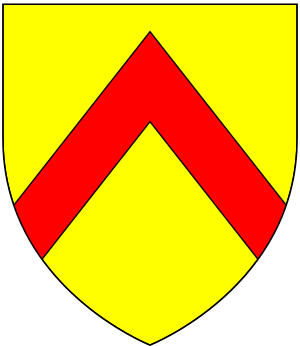Edmund Stafford facts for kids
Quick facts for kids Edmund Stafford |
|
|---|---|
| Bishop of Exeter | |
| Appointed | 15 January 1395 |
| Reign ended | 3 September 1419 |
| Predecessor | Thomas Brantingham |
| Successor | John Catterick |
| Orders | |
| Consecration | 20 June 1395 |
| Personal details | |
| Born | 1344 |
| Died | 3 September 1419 |
| Buried | Exeter Cathedral |
| Denomination | Catholic |
| Previous post | Dean of York |
Edmund Stafford (born in 1344, died on September 3, 1419) was an important English church leader and government official. He served as the Bishop of Exeter from 1395 until his death. He also held powerful roles working for the King of England.
Contents
Early Life and Family
Edmund Stafford was born in 1344. He was the second son of Sir Richard Stafford of Clifton Campville in Staffordshire. His family was well-known and connected to important people. His grandfather was Edmund Stafford, 1st Baron Stafford. His uncle, Ralph Stafford, 1st Earl of Stafford, was a very powerful nobleman.
Education and Church Career
Edmund Stafford went to Oxford University. He earned his first degree in 1363. In the same year, he became a canon of Lichfield Cathedral. A canon is a type of priest who works at a cathedral. He continued his studies, earning more degrees in law.
In 1385, he became the Dean of York. A dean is a senior leader in a cathedral. He also held the position of Rector of Clifton Campville, which was a church on his family's land.
Important Government Roles
Edmund Stafford held several very important jobs in the English government:
- Keeper of the Privy Seal: From 1389 to 1396, he was the Keeper of the Privy Seal. This person was in charge of the King's private seal, which was used to approve important documents.
- Lord Chancellor: Later in 1396, he was appointed Lord Chancellor of England. This was one of the most powerful positions in the government. The Lord Chancellor was the King's chief minister and head of the legal system. He held this role until 1399.
- Second Term as Lord Chancellor: He became Lord Chancellor again in 1401. He served until 1403.
Even after these roles, Edmund Stafford continued to advise the King. He helped with petitions in Parliament and was one of the King's councillors in 1406.
Bishop of Exeter
Edmund Stafford was chosen to be the Bishop of Exeter on January 15, 1395. He officially became bishop on June 20, 1395.
When he was busy with government work, he didn't visit his diocese (the area he was in charge of as bishop) very often. However, after 1403, he became much more involved. He made many visits to his diocese in 1404, 1411, and 1414, checking on churches and people.
Death and Burial
Edmund Stafford died on September 3, 1419. He was buried in the Lady Chapel of Exeter Cathedral. You can still see his detailed monument there today, which includes a statue of him.
 | Janet Taylor Pickett |
 | Synthia Saint James |
 | Howardena Pindell |
 | Faith Ringgold |


